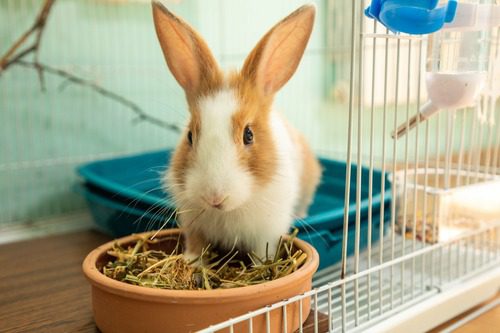What to Do if Your Rabbit is Not Eating
When a rabbit stops eating, it’s more than just a skipped meal, it can be a serious health concern. Rabbits have delicate digestive systems that rely on a constant flow of fiber-rich food to stay active. Even a 12-hour gap in eating can lead to complications, so it’s important to take any changes in appetite seriously. If you’ve noticed your rabbit isn’t interested in hay, pellets, or treats, understanding the potential causes and taking prompt action can make all the difference. Below, we’ll discuss what may cause appetite loss in rabbits, what signs to watch for, and why a visit to a trusted exotic veterinarian in Bradenton, FL, like Keystone Animal Hospital, is so important.

Why It’s Serious When a Rabbit Is Not Eating
Unlike some animals who can safely skip a meal or two, rabbits require constant grazing. Their gastrointestinal tract is built for continuous movement, largely fueled by hay and fresh greens. When a rabbit stops eating, digestion slows or stops altogether. This can lead to gastrointestinal stasis (GI stasis), a condition that causes the gut to become sluggish or nonfunctional.
GI stasis can quickly become life-threatening if not addressed. Food that sits in the intestines can ferment, producing gas and discomfort. This discourages the rabbit from eating or drinking, which only makes the problem worse. It’s a cycle that needs to be broken with the right intervention and time matters. While GI stasis is one of the most common outcomes when a rabbit is not eating, it isn’t the only concern. Refusing food may signal an underlying health issue such as dental disease, pain, stress, or an environmental problem that needs correction.
Causes for Your Rabbit Not Eating
If your rabbit isn’t eating, the cause could be physical, emotional, or environmental. Below are the most common reasons a rabbit may refuse food.
Dental Problems
A rabbit’s teeth never stop growing. If they’re not worn down properly by chewing hay and fibrous foods, overgrown teeth or sharp points can form. This can make eating painful and difficult. Dental disease is a frequent cause of appetite loss in rabbits, and it often develops silently over time.
Gastrointestinal Stasis (GI Stasis)
As mentioned above, GI stasis can result from pain, stress, lack of fiber, or dehydration. Once digestion slows, gas and bacteria build up, leading to discomfort and a reduced desire to eat. The longer it continues, the harder it is to reverse without veterinary care.
Stress or Environmental Changes
Rabbits are highly sensitive to changes in their environment. A new pet, loud noises, relocation, or even a new type of food can cause stress. Stress can lead to loss of appetite and digestive upset, particularly in more timid rabbits.
Pain or Illness
Any source of pain, whether from arthritis, injury, or illness can make a rabbit reluctant to eat. Internal health conditions such as liver or kidney disease, infections, or parasites may also contribute to a sudden loss of appetite.
Inappropriate Diet
If your rabbit is eating too many pellets or treats and not enough hay, digestive imbalances may occur. A diet too low in fiber or high in carbohydrates can reduce gut motility and increase the risk of GI stasis.
Signs to Watch for When Your Rabbit Is Not Eating
When a rabbit is not eating, it’s rarely the only symptom. You may also notice other signs that indicate discomfort or illness:
- Changes in Fecal Output: Fewer droppings or smaller, misshapen ones are a sign that the gut isn’t working properly. Rabbits with GI stasis often stop producing feces entirely.
- Lethargy: If your rabbit seems unusually still, uninterested in interaction, or is hiding more than usual, this may indicate discomfort or illness.
- Teeth Grinding or Hunched Posture: Rabbits in pain may grind their teeth audibly or sit hunched in one spot. This behavior is especially common with GI discomfort or dental pain.
- Bloating or Tense Abdomen: You may notice that your rabbit’s belly feels firm or distended. This can be a sign of gas buildup or digestive stasis and requires urgent attention.
- Reduced Water Intake: Rabbits that stop eating often reduce their water intake as well. Dehydration can complicate digestive problems and worsen the situation.
What to Do if Your Rabbit Is Not Eating
Once you notice your rabbit isn’t eating, you’ll want to take prompt action. Waiting too long can allow conditions like GI stasis to escalate.
Contact Your Veterinarian Immediately
Loss of appetite in rabbits should always be treated as urgent. Call Keystone Animal Hospital at (941) 741-8445 right away to discuss your rabbit’s symptoms. Early intervention by a veterinarian trained in exotic animal care is essential.
Do Not Attempt Home Remedies
While it may be tempting to try syringe feeding or over-the-counter medications, doing so without guidance can be harmful. Your veterinarian needs to determine the cause of your rabbit’s appetite loss before treatment begins.
Monitor Droppings and Behavior
Track changes in stool size, consistency, and frequency. Also, note any behavior shifts, such as hiding, unusual posture, or a lack of interest in surroundings. These details can help your veterinarian assess the issue more accurately.
Limit Stress and Keep the Environment Calm
Keep your rabbit’s surroundings quiet, clean, and familiar. Remove any stressors such as loud noises, unfamiliar animals, or unnecessary handling until your rabbit is evaluated.
How Keystone Animal Hospital in Bradenton, FL Can Help
When your rabbit is not eating, having a knowledgeable veterinary team you can trust is essential. At Keystone Animal Hospital, we offer advanced diagnostics, gentle handling, and tailored care plans specifically for exotic pets like rabbits.
Comprehensive Physical Exams
Our team performs thorough exams to assess dental health, digestive function, hydration levels, and other critical indicators. Rabbits require specific handling and diagnostics, which our experienced veterinarians are trained to provide.
Diagnostic Imaging and Lab Testing
We may recommend X-rays, bloodwork, or fecal analysis to rule out underlying illness or detect GI complications early. This helps determine the most appropriate course of action quickly.
Individualized Treatment Plans
Depending on the diagnosis, treatment may involve fluids, pain management, nutritional support, and other medical interventions, which are all tailored to your rabbit’s specific condition.
When It’s Time to Seek Emergency Care
If your rabbit hasn’t eaten in 12 hours, isn’t producing droppings, or shows signs of bloating or distress, contact us immediately. These are red flags for serious complications like GI stasis or other internal issues. Rabbits are masters at hiding pain, so outward signs may appear only after a condition has progressed. Any delay in treatment can reduce the chances of recovery. If you’re unsure whether your rabbit’s symptoms warrant a visit, err on the side of caution and call (941) 741-8445 right away.
Your Rabbit’s Appetite Is a Window Into Their Health
Your rabbit’s eating habits offer insight into their overall well-being. A sudden lack of interest in food is always cause for concern and should prompt a call to your veterinarian. At Keystone Animal Hospital in Bradenton, FL, we’re here to support your rabbit’s health with expert care and guidance. If your rabbit is not eating or acting like themselves, call (941) 741-8445 today or request an appointment. Your rabbit’s comfort and recovery start with swift, informed action.
